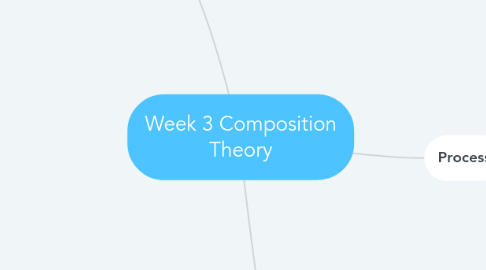
1. Expressivism
1.1. Criticism
1.1.1. It encourages blind individualism, a rejection of the material world and "politeness" that prevents arguments that would change the status quo (GCP).
1.1.1.1. Response from expressivism supporters: people can be empowered by "personal awareness" and act with agency and resistance (GCP).
1.2. Teachers focus on the writer, the writer's "imaginative, psychological, social and spiritual development" and how that growth impacts a writer's "individual consciousness and social behavior" (GCP, 113).
1.3. Practices promoted: journaling to reflect in and keep track of "individual experience and personal development" (GCP, 114).
1.3.1. Also self-assessment, which helps students grow and "resist and claim agency" (122).
1.3.1.1. Problems with reflection, according to Reid (FYC, Ch 7): if writing it for a grade, students will write for the teacher or turn their reflection into a confessional about their struggles.
1.3.1.1.1. Solve this by treating reflections/self-assessments like lab reports and focusing on what tools, time and strategies helped. (Reid, FYC).
1.3.2. Engaged Pedagogy: teachers must have a voice and be self-actualized and vulnerable in order to empower their students.
1.4. Benefits:
1.4.1. Students often do better with academic research if writer “uses paper to explore his or her own personal experiences in the area.” Elbow also points out that adults and professionals mix the personal and academic, even if students aren't often allowed to do so (something that was also mentioned in GCP).
1.4.1.1. Elbow says: "Students often use informal language for impersonal topics even if they have been directed to avoid it. But teachers should note how often good writers in the world bring to bear personal language and personal thinking on nonpersonal topics—and that most of our students will do virtually all of their future writing outside the academy.” So should we stop holding students up to particular academic language? Or does this tie back to the idea of having students write for an audience and purpose, and that would determine level of formal language needed?
1.4.2. Goldblatt: "Without an urgency that is felt as personal, a writer will always be looking to the teacher, the boss, the arbiter for both permission to begin and approval to desist. [Students] must learn how to find the motive spark, the intention to speak, within whatever subject they take up." How do we teach this to students? How can a teacher inspire intrinsic motivation?
1.4.2.1. One possible answer: following Reid's footsteps and introducing students to “passionate affinity spaces where people gather to share their interests in a particular activity.” Could also get rid of students' desire to stop writing because writing online never ends - people are always reading and responding.
1.4.2.2. Reid makes a similar claim, stating writers must want to improve in order to actually improve.
1.4.2.2.1. Possible solution: offering opportunities for reflection on past and present writing processes and feelings, so as to create a long-lasting writing practice.
1.4.3. Writing can turn "private meaning to shared meaning that results ultimately in some action." Writing is political! (GCP).
2. Process
2.1. Process was anti-establishment and focused on creativity, imagination and developing an authentic voice (GCP)
2.2. Kinds of writing tools/techniques/practices emphasized:
2.3. Valued: focusing on the process, improving the learner, seeing writing as more than a sum of its parts, being student-centered, writing to think (or figure out what you want to write about) and is socially dynamic in effort (GCP).
2.4. Criticisim
2.4.1. Post process: there is no clear definition of post-process, but it seems to refer to a move in which people believed “communication is paralogic – unpredictable and uncodifiable – and that composition must find ways to reflect this idea in theory and practice" (GCP).
2.4.2. Often "mindlessly translated" into classroom (GCP).
2.4.3. Possible solution: possibly, the Writing About Writing theory, which "recognizes the impossibility of teaching a universal academic discourse...and seeks instead to improve students’ understanding of writing, rhetoric, language and literacy” (GCP, 225).
2.4.3.1. Goldblatt worries that people are too focused on “writing about writing” and teaching writing skills that will “transfer” to workplace. Can forget the importance of writing about intimate experiences and connecting with “communities in need.”
2.4.4. The “writing process” approach has “devolved to a similar kind of risk-management, using a set of pre-established procedures that all students can follow to compose passable essays," according to Alexander Reid, Ch 7 FYC.
2.4.4.1. Possible solution: showing students that every rhetorical act has a risk and reward by having them post their writing online and therefore not only consider the risks and rewards for the grade in the class, but also on possible audiences reading their work. (Reid)
2.4.4.1.1. Additional possible solution: guaranteeing students a B and requiring them to take risks in order to get an A. (Reid). If, as other authors claim, we must be vulnerable in order to let our students be vulnerable, what risks as teachers should we be taking in order to promote the same attitude in our students?
2.5. Murray says we must teach and talk less, and let students write more. We also must not do the prewriting for our students or we'll take away their opportunity for discovery. But how do we give students enough guidance without doing too much work? What kind of questions or feedback can we offer that triggers individual contemplation and how can we learn how to be patient enough to let students figure their message out on their own?
2.5.1. Murray also suggests to let students find their own subject and meeting. This again, for me, brings up the tension between teacher goals and school requirements. How can we craft assignments that meet curriculum requirements while also giving students more agency?
